Do It, but Don’t Over Do It 0
The Dynamics of Demonstrated Interest
By Eric Hoover
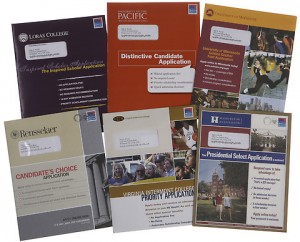 This year, American University received a record 17,000 admissions applications, a 13 percent increase over last year. With quantity came quality: by various statistical measures, the university will admit its most accomplished, most diverse class ever this fall. And American’s admit rate fell to 43 percent from 53 percent this year.
This year, American University received a record 17,000 admissions applications, a 13 percent increase over last year. With quantity came quality: by various statistical measures, the university will admit its most accomplished, most diverse class ever this fall. And American’s admit rate fell to 43 percent from 53 percent this year.
In the numbers-driven realm of admissions, all this is good news, a sign of rising fortunes. But it’s also a complicated development. For one thing, applications have swelled at so many selective colleges that the meaning of such an increase can be difficult for a given admissions office to interpret (increases this year could portend increases next year-or not). Moreover, as colleges become more selective, they often find themselves competing with institutions a rung or two higher on the ladders of selectivity and desirability, at least for the top students.
Although there is prestige in this kind of association, there is also uncertainty. How many applicants would turn down a super-selective, big-name college to attend a somewhat less-selective, less-famous one? How do you know whether a student considers your college a top choice or a “safety school”? How does an applicant’s sense of “fit” with a college relate not only to matriculation, but also retention?
In recent years, such questions have prompted American’s admissions team to look more closely at “demonstrated interest,” the popular term for the contact students make with a college during the application process, such as by visiting the campus, participating in an interview, or e-mailing an admissions representative. In theory, it’s a way to measure the likelihood that an applicant will matriculate-and succeed if they do.
Do You Want to be a Doctor? 0
 Do you have a student or are you a student with aspirations to be a Doctor of Medicine or pursue any healthcare profession? With all the talk about healthcare issues and challenges, our basic western system of Allopathic medicine continues to frustrate both the patient and caregiver. My strong suggestion to aspiring doctors and nurses is to read this book and/or this one and watch this in its entirety before entering a field that is getting more purblind in understanding true wellness and based on scientific methods that have proven to be inadequate when it comes to curing …much less preventing disease.
Do you have a student or are you a student with aspirations to be a Doctor of Medicine or pursue any healthcare profession? With all the talk about healthcare issues and challenges, our basic western system of Allopathic medicine continues to frustrate both the patient and caregiver. My strong suggestion to aspiring doctors and nurses is to read this book and/or this one and watch this in its entirety before entering a field that is getting more purblind in understanding true wellness and based on scientific methods that have proven to be inadequate when it comes to curing …much less preventing disease.
My philosophy of placing more emphasis on the prevention of disease than the treatment of symptoms and  strengthening the body’s natural immune system is making more sense as the nation as a whole becomes sicker physically, mentally, and spiritually. Bastyr University and other Naturopathic colleges teach that approach. It is all about the ounce of prevention that is worth more than a pound of cure. Particularly when the cure is simply designed to manage the symptoms with questionable drugs and not address the real cause of the disease. Recently, intelligent whistleblowers are speaking out against the other big-money maker product, vaccines! It is, particularly now, a big risk as more M.D.s are realizing how damaging vaccines can be. In this day and age, it is very important that parents, particularly mothers, research the reasons for any vaccines and how they are determined to be safe before allowing their children to be vaccinated.
strengthening the body’s natural immune system is making more sense as the nation as a whole becomes sicker physically, mentally, and spiritually. Bastyr University and other Naturopathic colleges teach that approach. It is all about the ounce of prevention that is worth more than a pound of cure. Particularly when the cure is simply designed to manage the symptoms with questionable drugs and not address the real cause of the disease. Recently, intelligent whistleblowers are speaking out against the other big-money maker product, vaccines! It is, particularly now, a big risk as more M.D.s are realizing how damaging vaccines can be. In this day and age, it is very important that parents, particularly mothers, research the reasons for any vaccines and how they are determined to be safe before allowing their children to be vaccinated.
Not convinced? Here is a refreshing well-researched article by a West Point graduate and former army officer. Now, with Codex Alimentarius, Big Pharma is trying to make it illegal for a physician to practice proven alternative therapies to heal the body and/or prevent the disease in the first place. Call me if you wish to explore proven solutions in how to achieve optimal health for your family. It’s not “rocket science”. Eric Goodhart
Future Docs Are Confused, Too
Struggling to understand the national debate over health care? You’re not alone — your future doctor may well be baffled, too.
A study published in the September issue of Academic Medicine found that nearly half of all medical students believe they have been inadequately educated about the “practice of medicine” — especially related to medical economics.
Our patients expect us to understand the system, said Matthew M. Davis, one of the researchers and an associate professor of pediatrics and internal medicine in the Child Health Evaluation and Research Unit at the University of Michigan’s medical school. “If we don’t, that can result in poor patient care. And if we don’t expect doctors to understand the health care system, who is going to?
The study, by Davis and two colleagues at Michigan, examined tens of thousands of survey responses from medical students about the extent and perceived quality of their training in an array of curricular areas, including clinical care and decision-making and the practice of medicine — with the latter including health care systems, managed care, and practice management, among other areas. Read more »
Don’t Wait – It May Be Too Late! 0
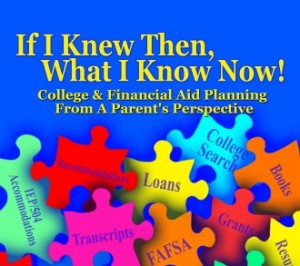 It used to be January, but now it can be as early as October of the senior year when  thousands of families will be filing the FAFSA, Profile and/or Institutional financial aid forms. Many will be waiting for several months before they know if any of the colleges their child has applied to will be affordable. Even if college is more than five years away, a ‘heart attack prevention’ a Dry Run exercise is always a smart idea; even for those parents who believe that money is no object. The parent’s cry for help below is not unusual. However, it can be avoided when someone who is familiar with the individual college financial aid methods used by a wide range of colleges, gives you a realistic view of your family’s future Expected Family Contribution (FM & IM EFC). A projection that is based on the often complex methodologies colleges use to determine need.
It used to be January, but now it can be as early as October of the senior year when  thousands of families will be filing the FAFSA, Profile and/or Institutional financial aid forms. Many will be waiting for several months before they know if any of the colleges their child has applied to will be affordable. Even if college is more than five years away, a ‘heart attack prevention’ a Dry Run exercise is always a smart idea; even for those parents who believe that money is no object. The parent’s cry for help below is not unusual. However, it can be avoided when someone who is familiar with the individual college financial aid methods used by a wide range of colleges, gives you a realistic view of your family’s future Expected Family Contribution (FM & IM EFC). A projection that is based on the often complex methodologies colleges use to determine need.
The earlier the better
Please read this exchange carefully between a disappointed parent and a US News expert:
Question:
My son has recently been accepted to his first choice college, Lehigh University. They have provided him with loans and grants that equal approximately $28,000. The COA is $69,425 a year. My wife and I do not have available funds to make up the difference. What methods can be suggested to give my son the opportunity to attend this school? In high school he has maintained a high academic level, and ranking of 27/499.
Answer:
I hope you have been successful in exploring your financing options. If you haven’t already considered it, a private (non-federal student loan is another option. Many lenders offer non-federal student loans, in which the parent acts as the co-signer. Look for features such as a co-signer release once the student establishes a good repayment record, or reduced interest rates for automatic payments from a bank account. Ask Lehigh if they have any recommendations.
Best wishes to you.
Verna Hazen, U.S. News Expert
____________________
 How much is free advice worth? In this case . . . not much. Too little, too late is my first thought; what is yours? Why didn’t he find out that this would be his probable outcome earlier?
How much is free advice worth? In this case . . . not much. Too little, too late is my first thought; what is yours? Why didn’t he find out that this would be his probable outcome earlier?
RATIO ~ SCHMATIO 0
RATIO, SCHMATIO
By SAMANTHA STAINBURN (Former managing editor of Teacher Magazine)
ISABELLE CARBONELL, a college senior from Bethesda, Md., has thrived over the last four years as part of a small learning community. Most of her classes have had fewer than 35 students. For freshman and sophomore years, her dormitory was in the same building as the cafeteria and many of her classrooms and professor’s offices. You see the same people over and over, and that lets you create networks, she says. You get to know your professors informally. You see them in the hallway, they say, How that project going along and you bounce ideas off them. Prospective undergraduates are deluged with statistics from average class size to the number of Nobel Prize winners on staff with which to take the measure of a college. Is Ms. Carbonella’s story an argument for choosing your college by the numbers?
Not exactly. She attends the University of Michigan at Ann Arbor, which has some 25,000 undergraduates, 4,100 full-time faculty members and 540 buildings. If she had been looking for an intimate experience, the numbers would have led her elsewhere.
That’s just one of the problems with statistics: they rarely tell the whole story. (Ms. Carbone’s story is that she signed up for Michigan’s Residential College, a program in which students live and attend classes in the same building. She now lives off campus but continues to take classes in the R.C. building.)
Another problem with numbers: Often statistics don’t measure what’s important, says Lloyd Thacker, executive director of the Education Conservancy, a nonprofit group working to improve the college admissions process. For example, the selectivity of a college, measured by how many applicants it denies, provides little information about the educational experience there. Read more »
Now What? 0
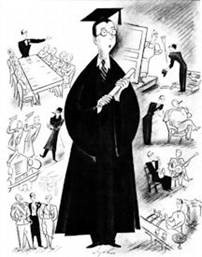 Now What? That is the title of a book by Ari King, in 2009 he was an unemployed graduate of Wesleyan University with a $180,000 degree in Italian Studies. He spent the summer after graduation at his home in California thinking about what to do with his life. At summer’s end, with no job prospects, he headed to New York City thinking his opportunities would be better in a town with 8.4 million people.
Now What? That is the title of a book by Ari King, in 2009 he was an unemployed graduate of Wesleyan University with a $180,000 degree in Italian Studies. He spent the summer after graduation at his home in California thinking about what to do with his life. At summer’s end, with no job prospects, he headed to New York City thinking his opportunities would be better in a town with 8.4 million people.
A friend who was a senior at NYU offered him a place to stay with his five roommates. It was deja vu all over again, but now with six roommates, not one. Sleeping bags come in handy in the city when there isn’t a couch available.
Each day he would scour Craigslist and elsewhere, looking for jobs under every category from ˜Government” and ˜Education” to ˜Russian speaking Nanny” to ˜Security Guard”. He grew increasingly frustrated, with a gnawing feeling of defeat and anxiety. Even hospitality jobs, where a decent income from tips could be quite good, were scarce. Once a person landed such a job, they didn’t leave. With the unprosecuted malfeasance on Wall Street, everyone was playing it safe.
His real world wake-up call reaffirmed what I have been seeing for the last 25 years. Too many colleges, for one reason or another, do not prepare their students to bridge the gap from college to the real world very effectively. Of course, we cannot put the blame entirely on colleges. That is why I tell high school students that it is their responsibility to thoroughly research the advising and career services of the colleges they are considering. It is the all-important third A in the AAA process. Plus, they must become a familiar face and known to the personnel in the career services offices no later than the second semester of freshman year. After all, what is college for?
Now, because of the latest pandemic (remember this one?) many people are unemployed or underemployed, not just recent college graduates. What does one do when one can’t get a job? Some may say, keep looking; don’t quit! Easy for them to say. But there is one thing that many bright people with initiative (college degree or not) are realizing; that if you can’t find a job or don’t like the one you have, create one!
But first, you have to look within yourself and identify honestly what you are good at. Ask yourself if you can use that natural strength to not only meet a need that people have but will pay you to fill it. For instance, Ari King enjoyed writing and his teachers recognized he had a flair for writing. He looked around his world. Why not write a guidebook that will help college students prepare for life after college? He did not see many that addressed the issue. He thought “Would people be interested?” The answer, judging by these Amazon reviews, is yes!
While reading his book I was amazed at the majority of college graduates he interviewed who went to college with little thought put into how they were going to live and pay bills after college. Each graduate was asked what regrets he or she had and what could have been done differently. The majority said they did not use the career services office early enough (or at all) to find internships. No wonder so many were jobless upon graduation or working in jobs that a high school graduate would be qualified to do.
little thought put into how they were going to live and pay bills after college. Each graduate was asked what regrets he or she had and what could have been done differently. The majority said they did not use the career services office early enough (or at all) to find internships. No wonder so many were jobless upon graduation or working in jobs that a high school graduate would be qualified to do.
I recommend the book Now What? and encourage all students thinking about college or in college now to read it this summer before they realize that the years in college are a waste of time and money. Contact us if you REALLY want to make sure college is a good investment as well as learn how to keep yourself healthy during these challenging times…and beyond!
Are You a Procrastinator? 0
If you are, you may put off reading this. That would be your first mistake. To all you college bound students, you will soon be taking a milestone step in your life journey. Hopefully it will be the college of your dreams. Even if it is not, if you have done your research properly, all will work out fine. Thousands of college graduates have learned, in hindsight, that it was meant to be and it wasn’t bad after all.
They quickly learned in the first month of college that a professor’s expectations and assignments given would be nothing like those from teachers in high school, even those AP classes they took that were supposed to prepare them for college level work. Those that got through in four years quickly learned how to get organized and stay focused.
If you were a last-minute kind of student in high school, that may have worked. But college is a different world. If it is not, then you may be at the wrong college. Because if you are not challenged, you will not grow intellectually, spiritually, or socially. But I digress.
The phrase “I’ll do it later” is probably the biggest killer of college success. Chances are, you will not get it done later. If you do wing it later, it will be sloppy and not your best effort. This causes stress and sets you up for the kind of anxiety that leads to dropping out of college because of low grades and/or illness.
The day planner that your proud grandmother gives you at high school graduation won’t do you any good if you are constantly putting things off. Sometimes students (and adults) put things off because they are intimidated by them. It manifests in the subconscious. You are afraid of failure so you set yourself up for failure. The solution is to simply get started. Break the task into manageable chunks and schedule time for each task.
Maybe it is long blocks of time that you find intimidating or tedious. No problem. You can do anything for 25 minutes. Am I right? Work with NO distractions. Put the electronic gizmos away and out of sight and sound. That includes the ear buds. No, you don’t work better when you listen to music. 🙂
Buy a timer and set it for 25 minutes. Focus on the task seriously for that period. As you begin to see something accomplished, whether it is a writing or reading assignment, you will begin to feel better about it. Dare I say, even inspired to do more. You also will soon realize that by tacking homework when it is assigned is soooo much easier than waiting until the 11th hour.
Still stuck? Another technique you can apply is to blatantly lie to yourself. Tell yourself that you don’t have to do the entire thing. You are just going to read a couple of paragraphs or just draft an outline. What will happen is that you will get some momentum going and realize that you can do more than you first thought.
Reading a few paragraphs becomes finishing the whole chapter. Outlining the paper becomes drafting the first paragraph and so on.
You are not alone, the majority of humans find a reason to put things off that we either don’t deem important or don’t like even if we know it is important. Even administrators at the most selective colleges like Princeton University realize that procrastination needs to be addressed. Look here to see what they have done to help their undergraduates.
Pursuit of the Truth Should be an Ongoing Quest 0
 Many of us remember the inspiring words delivered by our 35th President, “Ask not what your country can do for you, ask what you can do for your country.” The Peace Corps was one of JFK’s dreams that is still carried on by not only college graduates but altruistic older adults as well.
Many of us remember the inspiring words delivered by our 35th President, “Ask not what your country can do for you, ask what you can do for your country.” The Peace Corps was one of JFK’s dreams that is still carried on by not only college graduates but altruistic older adults as well.
JFK woke up many independent thinkers of his generation. But his tragically short administration ended on Friday, November 22, 1963, AP US History books barely talk about it other than to say he was the President prior to LBJ who passed the Civil Rights Act of 1964. That Act was the culmination of what JFK started albeit slowly because of Democrat resistance in the south during his Presidency.
Subsequent to his death, many thought (as I did) that JFK had the intent to return our current banking system to the control of the US government, not a central bank controlled by international bankers. This would require changing the way the private Federal Reserve did business or eliminating it altogether, as Abraham Lincoln tried to do before he was assassinated. Unfortunately, that may not be accurate, as this historian points out.
In any case, following his tragic death, many changes took place. One may come as a shock to you. It was the scheme by the Rockefeller and Ford Foundations to promote and fund the women’s ‘liberation’ movement. As a strong supporter of women, I thought that was a good thing. But there were ulterior motives behind what appeared to be a noble effort by the financial backers of the women’s lib movement.
 The private banks that own the Federal and State tax-exempt Federal Reserve (watch that superb documentary) needed more citizens to pay taxes. More money they printed (out of thin air) and loaned with interest to Congress needed to be paid back. In the 1950’s it was rare that a mother would have a full-time job outside the home. One parent’s income would cover most family needs. In time, because of increased government borrowing and the resulting devaluation of the dollar, it became necessary for both parents to be working to pay the bills for basic goods and services. It was a strategy that has had a subtle negative short and long-term effect on many families. As a Rockefeller family member revealed to the late highly respected movie producer Aaron Russo, it was designed to do just that.
The private banks that own the Federal and State tax-exempt Federal Reserve (watch that superb documentary) needed more citizens to pay taxes. More money they printed (out of thin air) and loaned with interest to Congress needed to be paid back. In the 1950’s it was rare that a mother would have a full-time job outside the home. One parent’s income would cover most family needs. In time, because of increased government borrowing and the resulting devaluation of the dollar, it became necessary for both parents to be working to pay the bills for basic goods and services. It was a strategy that has had a subtle negative short and long-term effect on many families. As a Rockefeller family member revealed to the late highly respected movie producer Aaron Russo, it was designed to do just that.
Most college students don’t know that the Internal Revenue Service is a de facto government agency. It is simply  the collection agency for the private international bankers that own the Fed. Not a dime of the Federal income tax paid to the IRS goes to the US government. It all goes to the interest on the debt incurred by our Congress that borrowed the fiat currency to pay for various programs; perpetual wars and covert intelligence activities around the globe.
the collection agency for the private international bankers that own the Fed. Not a dime of the Federal income tax paid to the IRS goes to the US government. It all goes to the interest on the debt incurred by our Congress that borrowed the fiat currency to pay for various programs; perpetual wars and covert intelligence activities around the globe.
In July 1944 the world’s leaders met in Bretton Woods, NH to set the US dollar as the world’s reserve currency backed by gold and silver. In 1971 President Nixon, without consulting with other member nations, severed (“temporarily”) that agreement to link the value of the dollar to gold. The ‘golden age’ and credibility of the US dollar was over. This action was not a temporary measure; the global markets were flooded with fiat money which has increased over the years, leading to massive borrowing to fund the abovementioned questionable activities. For example, just the fraudulent war in Afghanistan costs the US 300 million dollars a day! And do not ignore the even more astronomical other costs of war.
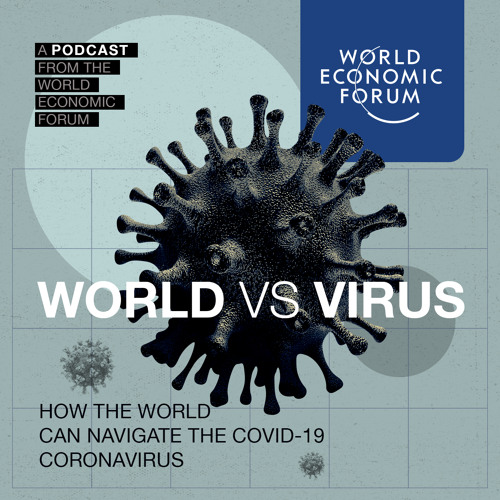 Since the declaration of a worldwide Pandemic at the beginning of 2020 many are questioning why the entire global economic system was shut down allowing only “essential” businesses to remain open with restrictions. There have been many pandemics, over the years (remember this one?). As long as you are reading about the importance of education, it is important to learn about your natural immune system and the part it plays in protecting you from an illness; something vaccines will NOT DO, because they are not designed for that purpose in the first place. In fact, there is evidence that what is being called vaccines are NOT vaccines at all. But they are actually experimental gene therapy injections and do NOT meet the CDC-stated characteristics of vaccines. (By the way, none of the thousands of victims from vaccinations given to them for Swine Flu in 1976 reported on the 60 Minutes TV show above, like Judi Roberts, who died in 2010, ever got any financial compensation from the pharmaceutical cartel.)
Since the declaration of a worldwide Pandemic at the beginning of 2020 many are questioning why the entire global economic system was shut down allowing only “essential” businesses to remain open with restrictions. There have been many pandemics, over the years (remember this one?). As long as you are reading about the importance of education, it is important to learn about your natural immune system and the part it plays in protecting you from an illness; something vaccines will NOT DO, because they are not designed for that purpose in the first place. In fact, there is evidence that what is being called vaccines are NOT vaccines at all. But they are actually experimental gene therapy injections and do NOT meet the CDC-stated characteristics of vaccines. (By the way, none of the thousands of victims from vaccinations given to them for Swine Flu in 1976 reported on the 60 Minutes TV show above, like Judi Roberts, who died in 2010, ever got any financial compensation from the pharmaceutical cartel.)
In addition, it is tragic that so-called institutions of “higher” education are still believing all the hype (aka lies and disinformation) and continue to push the allopathic medical/pharmeacuitical narrative. Honest scientific research and little critical thinking still exist there.
Evidence of that is succinctly provided in two recent 30 minute video talks by Dr. David Martin, Ph.D. Watch them both in there entirity before you believe everything on the CFR controlled network news.
There is now talk of a “Bretton Woods II” designed to gradually, but significantly change how business is transacted locally and globally by bringing about what the World Economic Forum officials are calling a “Global Monetary Reset”. Because they know most citizens of the world have limited attention spans they are coming right out with what they plan to do “in plain sight”! The plan is to replace paper money (currently printed out of thin air) with digitized money, also out of thin air, with no gold or silver backing it as it was originally set up in 1944 at the Bretton Woods Conference in N.H.. Even PBS’s Elmo on Sesame Street helps the World Economic Forum prepare children for the great “Global Reset”.
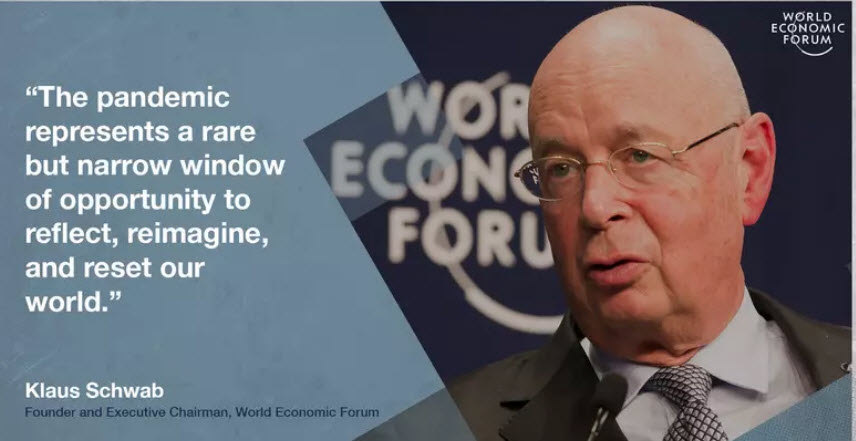 Matthew Blake has an impressive resume and a very slick three-minute presentation using jargon that may “cloud men’s minds” to what Klaus Schwab’s agenda for the “Global Reset” really is. Listen VERY carefully as you: Watch this. He finishes his smooth, albeit abstruse, presentation by ending his PR promo with “At the end of the day…”. A common phrase to soften what basically is a crime against humanity of massive significance to every human on the planet! For a FULL understanding of the true purpose behind the latest pandemic, one needs to sharpen one’s critical thinking skills and read this detailed analysis in its entirety, something, regretfully, most citizens will not do…will you? For a fact-filled video with an international attorney, watch this.
Matthew Blake has an impressive resume and a very slick three-minute presentation using jargon that may “cloud men’s minds” to what Klaus Schwab’s agenda for the “Global Reset” really is. Listen VERY carefully as you: Watch this. He finishes his smooth, albeit abstruse, presentation by ending his PR promo with “At the end of the day…”. A common phrase to soften what basically is a crime against humanity of massive significance to every human on the planet! For a FULL understanding of the true purpose behind the latest pandemic, one needs to sharpen one’s critical thinking skills and read this detailed analysis in its entirety, something, regretfully, most citizens will not do…will you? For a fact-filled video with an international attorney, watch this.
If you have read this far, you may be asking “what can we do?” You have now learned some of the reasons behind this latest virus scare. Now, more of us need to listen to legal scholars, like Peggy Hall, who is being heavily censored by the CFR-controlled media. This interview will help the reader understand what action is now been taking place in various parts of the world and what the average person can do to stop the insane criminal madness.
Yes, there is a solution! (Email or call for the password.) But it requires the opening of our hearts and minds and being aware of our own cognitive dissonance. If that common, albeit limited way of thinking is not recognized, it will be very hard, if not impossible, to “see the big picture” let alone change it for the better. Finally, before you ask for the password to my essay that lays out the solution based on accurate knowledge of history NOT taught in schools or colleges carefully listen to this.
Is Getting Into College Easier? 0
Is Getting Into College Easier?
You may have read or heard about how the number of applications have spiked at so-called prestigious colleges around the country. That triggers fear in many households with college bound students. Fear is an often-used emotion to control the actions of people as to what to do (or not do) going forward. Some observers of the college selection process say it is actually easier to get into colleges (even the more competitive ones) than in previous years. Really?
They say that many students do not realize that getting into a good college today is a lot easier, and will become even more so in the coming years. That is the case, according to the Hechinger Report. The writers of the report say it is important to let go of the “fear” mindset because they claim it is one of the reasons why students do not bother to apply to more competitive colleges. Instead, they settle for lower quality schools, when they could have been accepted to much better institutions.
Actually, that is not the case with the students we have been guiding over the last 25 years. They are very much focused on the most competitive colleges, often too much so. When their college list begins to take shape, they are often doing it the wrong way from the top down, rather than the bottom up.
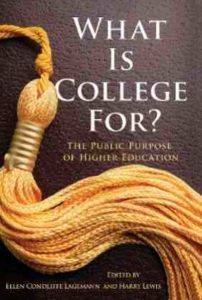 If the reader has college aspirations, you must first think about what is college for and why it is the logical next step for YOU? Though it may become easier to get accepted to college, the same due diligence in finding the colleges best qualified to help you reach your goals is just as important as always. Therefore, even though many colleges and universities may not be that selective, don’t neglect taking the steps that will help you determine if the college to which you apply is qualified to help you reach your goals.
If the reader has college aspirations, you must first think about what is college for and why it is the logical next step for YOU? Though it may become easier to get accepted to college, the same due diligence in finding the colleges best qualified to help you reach your goals is just as important as always. Therefore, even though many colleges and universities may not be that selective, don’t neglect taking the steps that will help you determine if the college to which you apply is qualified to help you reach your goals.
By the way, don’t fall for the well-meaning but misinformed guidance of colleges and some counselors that tell you “Don’t worry about what you want to major in or do for a career. You will have plenty of time to figure that out in college”. If you believe that, read this now.
Yes, it may be easier to get into college in the coming years as there will fewer high school graduates until 2023. We are already seeing college Enrollment Managers conceive ways to not only “fill seats” but with the most revenue/per seat. 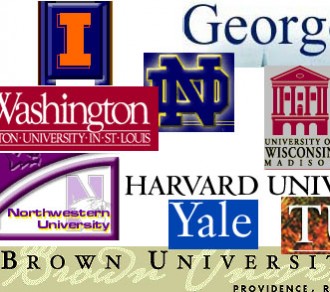 Many colleges and universities will be increasing their marketing efforts to attract these students. Families might get to finally have (dare I say) the negotiating power. That’s because these institutions compete with each other when it comes to the record number of applicants. You may already have seen how colleges encourage everyone to apply without regard to their qualifications. The more applications they get, the more they can reject, thus moving up in the rankings.
Many colleges and universities will be increasing their marketing efforts to attract these students. Families might get to finally have (dare I say) the negotiating power. That’s because these institutions compete with each other when it comes to the record number of applicants. You may already have seen how colleges encourage everyone to apply without regard to their qualifications. The more applications they get, the more they can reject, thus moving up in the rankings.
The National Student Clearinghouse Research Center‘s said that there’s actually going to be more colleges looking for students, so getting into college is not something students should be worried about. But what I say is, they should be worried about how they are going to pay for it. For that and other answers to your questions, call us.
Welcome! 0
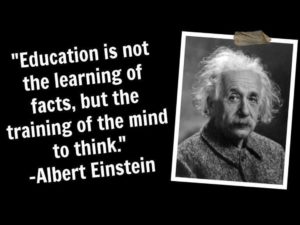 Einstein has been credited to have said “You cannot solve a problem with the same thinking that created the problem.” The origin of this very interesting statement doesn’t matter. What matters is that too many students, through no fault of their own, are not learning how to think critically even in college.
Einstein has been credited to have said “You cannot solve a problem with the same thinking that created the problem.” The origin of this very interesting statement doesn’t matter. What matters is that too many students, through no fault of their own, are not learning how to think critically even in college.
If there is a consensus that there is a problem it may be that though high schools and colleges say they teach students critical thinking skills, they may not be. Admittedly, it is not easy. Teachers have definitive guidelines to follow and tasks that sometimes have nothing to do with teaching cognitive skills and students have deadlines and diversions that often do not allow time to spend on things they don’t immediately see as important. We have ALL been there, haven’t we?
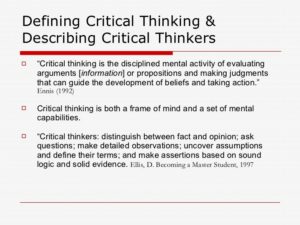 John Schlueter, a former journalist for Inside Higher Education, once pointed out that even though higher education has placed a great emphasis on critical thinking, no evidence suggests that such skills can even be taught. Critical thinking is a learned ability that MUST be taught. “If we realize that ‘critical thinking’ implies a set of general thinking skills that transfer from one subject or domain to another, then the task of identifying exactly what those skills are becomes extremely difficult, and perhaps impossible, to accomplish.”
John Schlueter, a former journalist for Inside Higher Education, once pointed out that even though higher education has placed a great emphasis on critical thinking, no evidence suggests that such skills can even be taught. Critical thinking is a learned ability that MUST be taught. “If we realize that ‘critical thinking’ implies a set of general thinking skills that transfer from one subject or domain to another, then the task of identifying exactly what those skills are becomes extremely difficult, and perhaps impossible, to accomplish.”
He points to research demonstrating that critical thinking only exists within the context that it is being taught, meaning that critical-thinking skills are rarely applicable across disciplines. Students must gain an exceptional amount of knowledge in a certain area before they can apply what they have learned to other fields of study.
I agree. I also believe that instructors must gain a deeper understanding of how they approach thinking within their own disciplines to help students develop better cognitive skills. However, many of them are entering the teaching profession without being taught the basics of how to think critically.
In every personal college and career planning binder, we prepare for our students,  we include a 13-page transcript of a college professor’s lecture he gave to over 350 other college professors, titled An Introduction to Critical Thinking. The reader can download it above to read and save for reference or in my essay Houston, we have a Problem The professor points out that while professors presumably have the ability to think critically because they had to learn such a skill to earn advanced degrees in their respective disciplines, many students never develop critical thinking skills. Why not?
we include a 13-page transcript of a college professor’s lecture he gave to over 350 other college professors, titled An Introduction to Critical Thinking. The reader can download it above to read and save for reference or in my essay Houston, we have a Problem The professor points out that while professors presumably have the ability to think critically because they had to learn such a skill to earn advanced degrees in their respective disciplines, many students never develop critical thinking skills. Why not?
 I believe the problem lies in that students are told “what to think,” not how to think. Many students find that learning the subject matter alone is so overwhelming that they have time for little else. Tests that are given do not measure a student’s critical thinking skills. Tests demonstrate the student’s ability to remember, dates, names, places, formulas, etc., etc., and have little to do with critical thinking.
I believe the problem lies in that students are told “what to think,” not how to think. Many students find that learning the subject matter alone is so overwhelming that they have time for little else. Tests that are given do not measure a student’s critical thinking skills. Tests demonstrate the student’s ability to remember, dates, names, places, formulas, etc., etc., and have little to do with critical thinking.
In 2009, I wrote about the Collegiate Learning Assessment. It was introduced in 2000. The purpose of the CLA was to measure and test college graduates’ critical thinking, analytic reasoning, problem-solving, and written communication skills. Since colleges’ participation was voluntary, and the results are not published it has served little purpose to the parents who are paying for most of the costs of college, now the student who wants to get the best return on investment. By the year 2011, the authors of the book Academically Adrift have determined that there is limited learning on college campuses.
This is why at Programs for Education, we encourage our students to understand what critical thinking REALLY means and understand what their natural and lifelong innate personalities and characteristics are to help them research and plan life beyond high school. Is college the next step or not? There are thousands of people who have accomplished success (what does success mean to you?) without a college degree. But if college is the next step, the buyer needs to know how to research the “product” beyond the rankings of colleges in US News & World Reports, et al.
REMINDER: If you are looking for something specific on our website, simply type in a KEYWORD into “Search”  e.g. Admissions, Scholarships, SAT, Advising, Drugs, JFK, Essays, Education, Major, Job, and so on. This will bring up all the articles related to that topic. Much of that information here will be helpful in your college planning depending upon your year of graduation.
e.g. Admissions, Scholarships, SAT, Advising, Drugs, JFK, Essays, Education, Major, Job, and so on. This will bring up all the articles related to that topic. Much of that information here will be helpful in your college planning depending upon your year of graduation.
Plus! Get your questions answered immediately on all college-related topics.  Some information, admissions, and financial aid tips we have for you here, you will not find anywhere else. Plus, if you are concerned about how to pay for college, we can show you how to pay for college from CASH FLOW ALONE. (See the last paragraph on that page.) Hundreds of parents have implemented this system and are not borrowing a nickel OR drawing down from savings. It is absolutely BRILLIANT!
Some information, admissions, and financial aid tips we have for you here, you will not find anywhere else. Plus, if you are concerned about how to pay for college, we can show you how to pay for college from CASH FLOW ALONE. (See the last paragraph on that page.) Hundreds of parents have implemented this system and are not borrowing a nickel OR drawing down from savings. It is absolutely BRILLIANT!
We offer to high school students and parents a FREE ‘get acquainted’ 75′ consultation online via ZOOM, phone, or in person, please call Eric Goodhart at 1 (978) 820-1295 or email using the ‘Contact Us’ link here.
“Exercising democracy between wars is like being a vegetarian between meals.”
It’s Not Just About Getting In 0
 Some students go to college knowing exactly what they want to do. But most don’t. At large state universities, it is not uncommon that over 75% percent of freshmen, even those who have declared a major, say they are uncertain about their major, and half will change their minds after they declare, sometimes more than once. That is one big reason that only 37% of students graduate in four years.
Some students go to college knowing exactly what they want to do. But most don’t. At large state universities, it is not uncommon that over 75% percent of freshmen, even those who have declared a major, say they are uncertain about their major, and half will change their minds after they declare, sometimes more than once. That is one big reason that only 37% of students graduate in four years.
Colleges and universities have vested interests in students declaring early. Retention rates for declared students are better, and they are more likely to graduate in four years. But college officials also recognize that deciding on a major can be overwhelming, especially when coupled with the fear that a wrong choice will result in added semesters and tuition. Especially when coupled with the fear that a wrong choice will result in added semesters and tuition. Students no longer have the luxury of stumbling into a major or making mistakes, not that they ever did.
This requires thinking ahead. Teenagers are not expected to know what to do with the rest of their lives at age 18,  but with coaching, they can cover the bases with prudent planning. Some majors have a curriculum that follows a tight sequence of courses. It’s easier to switch out of engineering than it is to take it up later in the college career.
but with coaching, they can cover the bases with prudent planning. Some majors have a curriculum that follows a tight sequence of courses. It’s easier to switch out of engineering than it is to take it up later in the college career.
The biggest mistake students make is failing to research what’s required of the major, and the profession. Nursing may sound attractive because a student wants to help people, but nursing students take the same demanding math and science curriculum as premed students, and the work is often technical and not for every kindhearted soul. It is also a similar track with Physical Therapy.
More niche filling additions to the list obviously reflect marketplace trends and student demand, like culinary science/culinology, digital arts, and sports communication. At Montclair State University in New Jersey, which offers 300 majors, minors and concentrations, new fashion studies major has been hugely popular, thanks to the university’s proximity to Manhattan; with Madison Square Garden and Giants Stadium in sight. It also guides the ambitious undergrad toward internship opportunities in a sports industry and event-planning major within its business school.
 Still, it’s difficult to predict the employment market. That is why I will encourage students to think outside the box. In other words, if the job doesn’t exist…create one. Many students choose majors they think will lead to jobs, but four years from now freshmen will be applying for jobs that don’t even exist today.
Still, it’s difficult to predict the employment market. That is why I will encourage students to think outside the box. In other words, if the job doesn’t exist…create one. Many students choose majors they think will lead to jobs, but four years from now freshmen will be applying for jobs that don’t even exist today.
Most employers are looking for transferable skills the ability to problem solve, work collaboratively, write and speak clearly and think critically. These can be developed in any liberal arts discipline. It makes no sense to suffer through a major because you think it will lead to employment.
In the final analysis, wherever a teenager goes and does after high school, which I call Crossing the Gap Preparing for the Transition, where they go does not matter as much as what they do when they got there.
The late great business philosopher, Jim Rohn, said this “A formal education will make you a living, but self-education will make you a fortune!” These two college graduates understood that. You can too! 1 (978) 820-1295


